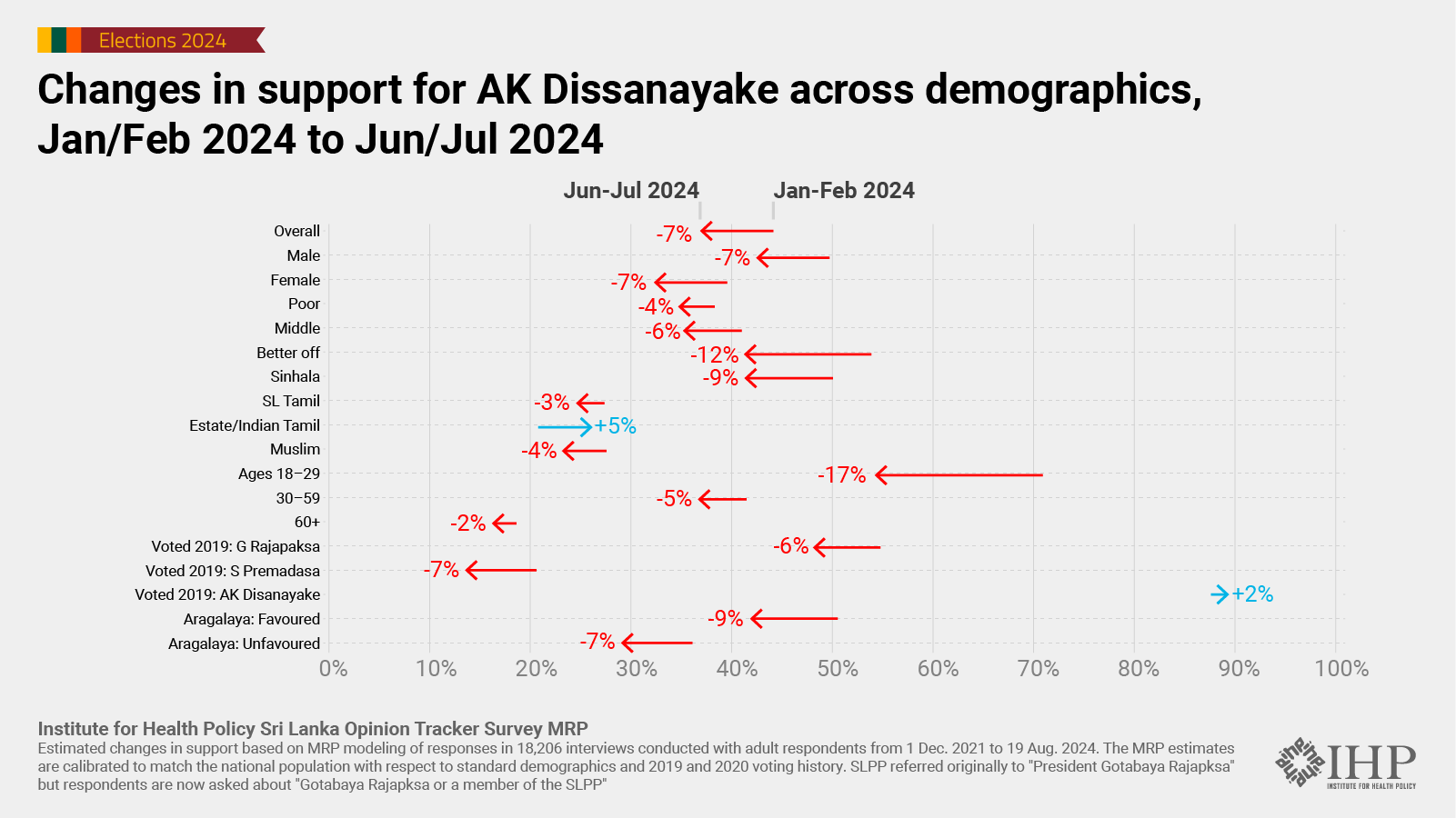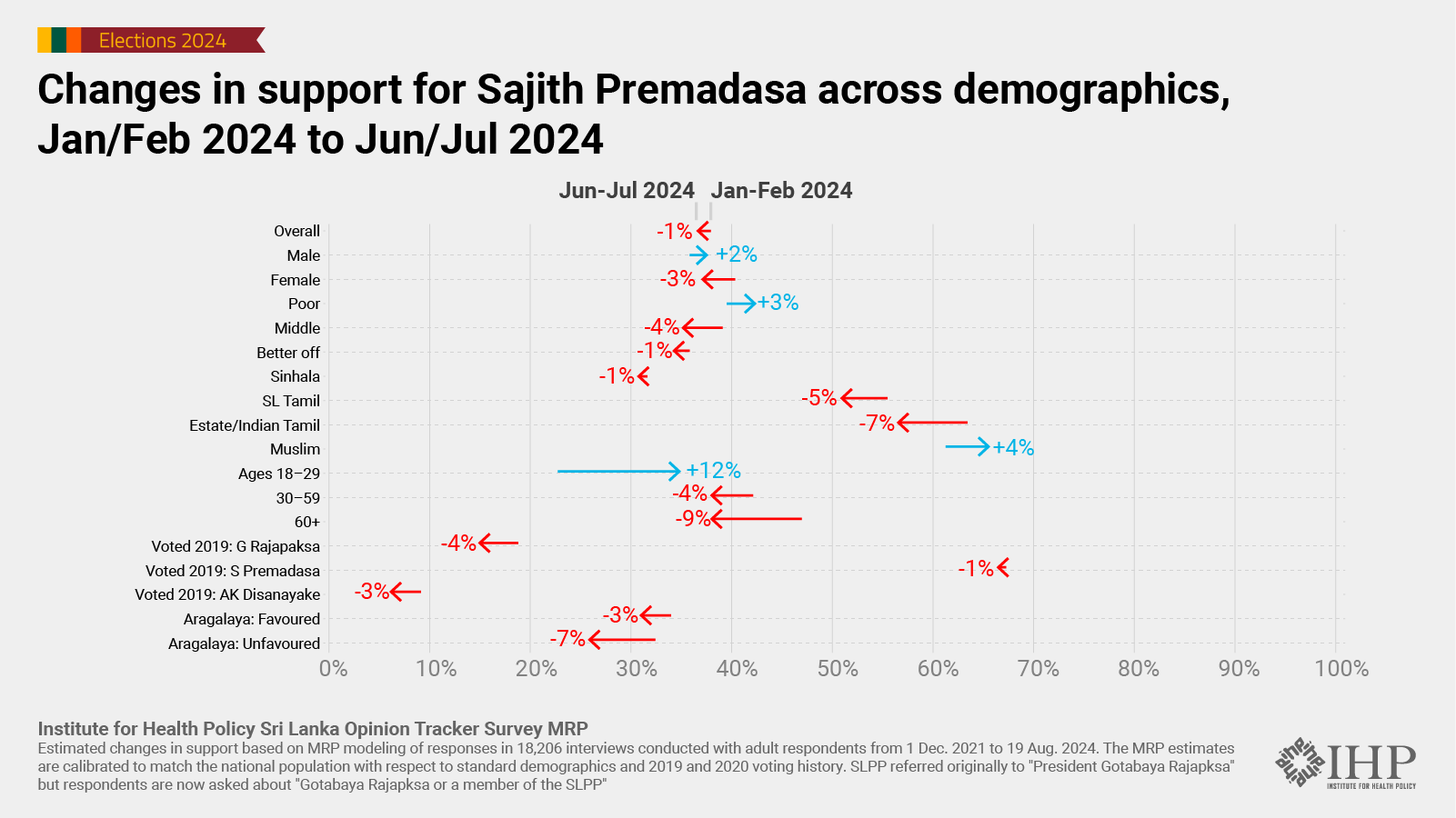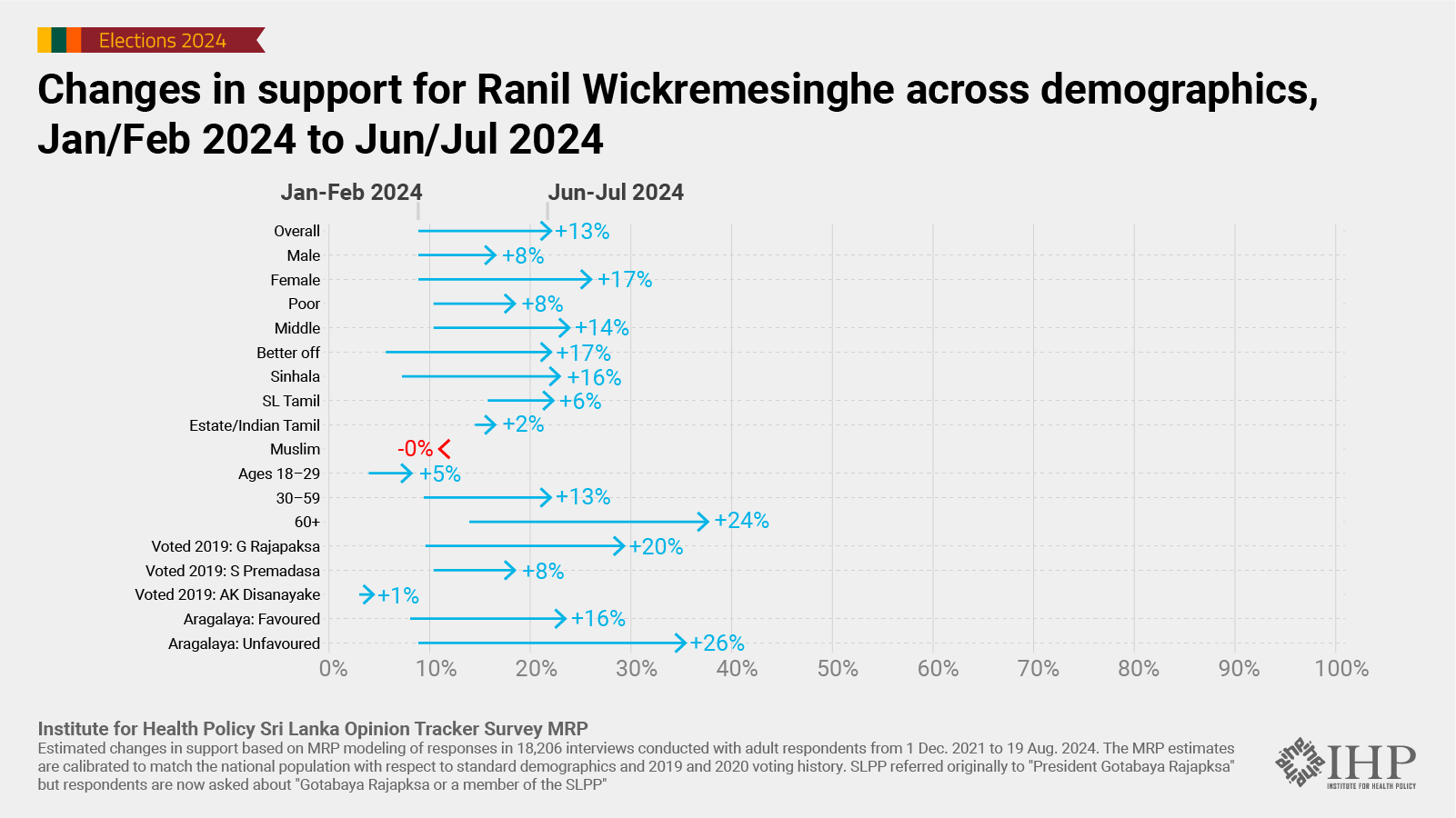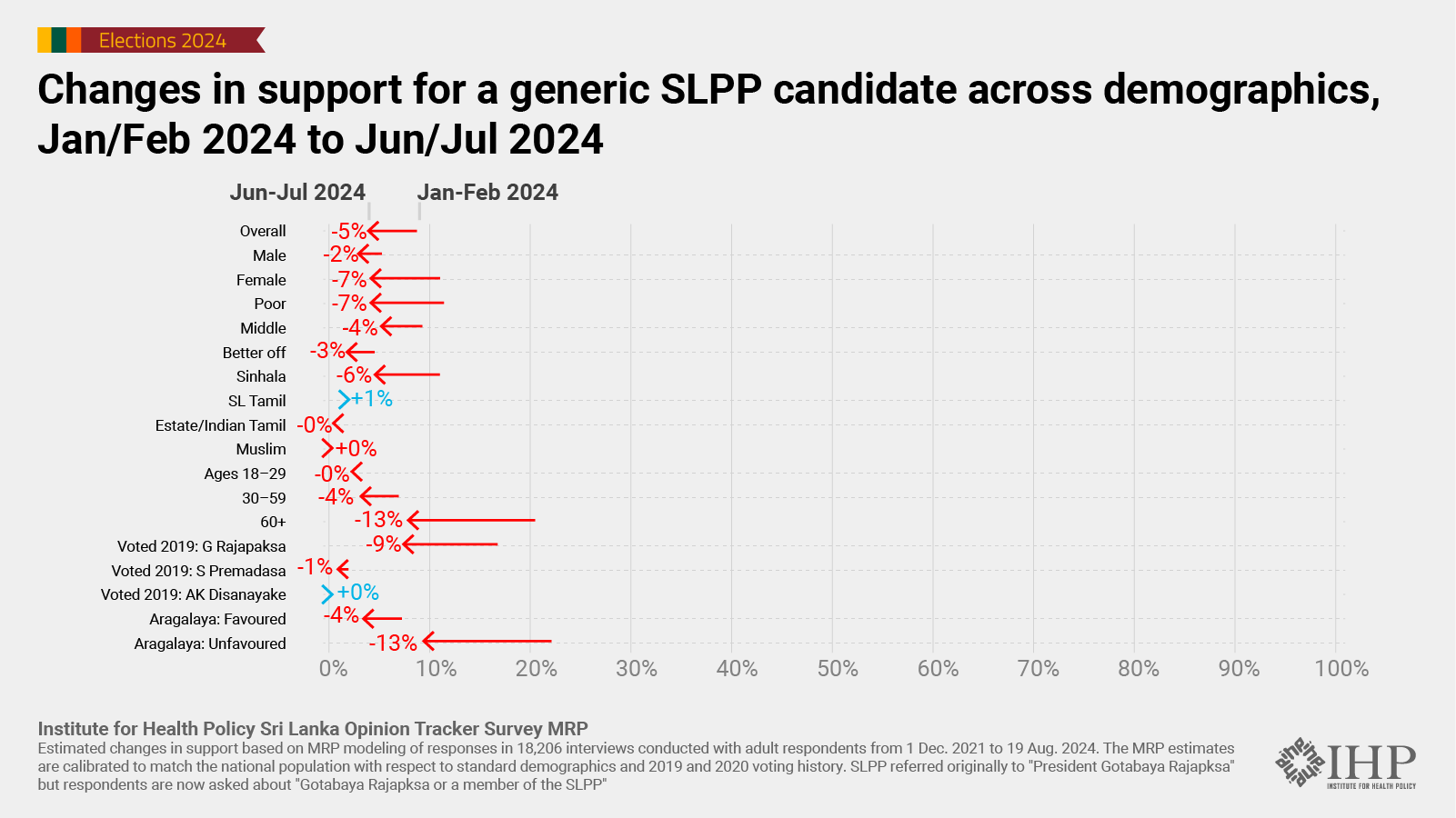Press Release
In first half of 2024, the most notable changes in voting intent were the rise in support for President Ranil Wickremasinghe as a potential Presidential candidate at the apparent expense of support for likely candidates from the NPP, SJB and SLPP. In IHP’s MRP (Multilevel Regression and Post-Stratification) model projections, support for NPP leader Anura Dissanayake, SJB leader Sajith Premadasa, and a generic SLPP candidate declined by 7%, 1% and 5% respectively from the first two months of the year to June/July 2024. The main beneficiary was President Wickremesinghe, whose support more than doubled, increasing 13% to 22% during the same period, although this still left him trailing in third place.
To shed some light on what was driving these changes, this analysis delves into our August 2024 MRP model estimates of voting intent to look at how support for the currently leading candidates changed in different demographic groups.
NPP leader, Anura Dissanayake, registered losses in support across most demographics, but the biggest losses were in his core base of the better-off, Sinhala and youth (18–29 years) voters, where support fell 12, 9, and 17 points respectively. Support amongst voters with a favourable view of the Aragalaya fell 9%–a bigger fall than Sajith Premadasa experienced, although he retained a strong lead over his opponents in these voters. He also lost support amongst voters who voted for Gotabaya Rajapakse or Sajith Premadasa in 2019, although the MRP estimates suggest he managed to consolidate his 2019 Presidential Election voters.
Sajith Premadasa also lost support across most demographics, with his biggest losses in older adults (60+ years) where his support fell 9 points. However, he did consolidate support amongst poor Sri Lankans (+3) and Muslims (+4), both groups where he led other likely candidates.
The shifts away from both Anura Dissanayake and Sajith Premadasa seem to have been largely to the gain of President Ranil Wickremesinghe. His support rose across all demographics, except in Muslims. This included a larger gain in women (+17% vs. +8% in men), improving his better performance in women. Shifts in his favour were biggest in better-off (+17), Sinhala (+16), older (+24), and former Gotabaya Rajapakse (+20) voters. But notably the biggest shifts in his favour were in anti-Aragalaya voters, where he gained 26 points to build a lead over all other likely candidates. To a considerable extent, President Wickremesinghe has been a major beneficiary of the core pro-government/Rajapakse/SLPP vote, which in the first half of the year largely collapsed across all demographics.




About IHP
IHP is an independent, non-partisan research centre based in Colombo, Sri Lanka. The SLOTS lead investigator is Dr Ravi Rannan-Eliya of IHP, who has trained in public opinion polling at Harvard University and has conducted numerous surveys over three decades.
Methodology
IHP’s SLOTS survey conducts telephone interviews with a hybrid sample of respondents, consisting of: (i) adults (18+ years) reached by random digit dialling of mobile numbers (RDD sample); and (ii) adults previously recruited by IHP as a nationally representative sample (cohort sample). The cohort sample is well balanced by age, gender, ethnicity and socioeconomic status, and was originally recruited in 2019 as a stratified probability sample drawn from 300 Grama Niladhari Divisions in all districts of Sri Lanka. Over time, the composition of the SLOTS sample has shifted to be predominantly RDD respondents, with cohort respondents tracked primarily to calibrate the overall sample.
The overall SLOTS samples cover all districts, ages, ethnicities, religions, sectors, and levels of socioeconomic status. All published SLOTS survey estimates are weighted to match the national population for age, gender, ethnicity, province, sector, education, and socioeconomic status. For analyses of voting intent, estimates are additionally matched to voting history (Presidential Election 2019, General Election 2020).
When asking for Presidential Election voting intent during the time period covered by this analysis, SLOTS interviews asked respondents to choose from a short list of Ranil Wickremesinghe, Sajith Premadasa, AK Dissanayake, and a generic SLPP candidate.
Unlike in conventional opinion surveys, IHP’s SLOTS MRP voting intent estimates are not weighted tabulations of the raw survey responses. First, non-responses and refusals to the voting history and voting intent questions are handled by multiple imputation models that consider a wide range of respondent characteristics and impute the probability distribution of who the respondent might have voted for or would vote for. Second, voting intent is estimated using Multilevel Regression and Post-Stratification (MRP) modelling. MRP involves modelling the voting choices of respondents in relation to their characteristics, and then using the estimated model parameters to predict how the full adult population would vote. As MRP does not lend itself to standard computations of survey error, IHP uses a multiple imputation approach to estimate the uncertainty in its model predictions, and this is reported as the margin of error. Specifically, the margin of error represents IHP’s best estimates of the range in which the true levels of voting intent would lie 95% of the time. The MoE here represents uncertainty related to how well the MRP model fits the observed data, as well as traditional sampling noise. However, it does not capture any systematic errors that might arise due to non-sample bias, such as when supporters of one party are less likely to be reached by phone or agree to be interviewed.
The analysis reported here are based on modelling of responses from 18,206 interviews conducted from 1 December 2021 to 19 August 2024, including 1,077 interviews conducted in January/February 2024 and 1,146 interviews conducted in June/July 2024. The margins of error are assessed as 2–4% for Ranil Wickremesinghe, Sajith Premadasa, and AK Dissanayake.
Funding
The SLOTS survey has previously been funded by the Neelan Tiruchelvam Trust, Asia Foundation, European Commission, UK National Institute for Health and Care Research, the Foundation Open Society Institute, and others. Current fieldwork is financed by the IHP Public Interest Research Fund and others. The sponsors play no role in the study design, analysis, or interpretation of findings. Furthermore, the survey findings do not necessarily reflect the views or positions of past and present funders. Interested parties can contact IHP for more detailed data and results.
EMBARGOED UNTIL
Date: 10 September 2024
Time: 05:00 PM Sri Lanka Time
FOR FURTHER INFORMATION CONTACT
Secretary/Administrator
Email: info ‘at’ ihp.lk
TO CONTACT LEAD INVESTIGATOR
Dr. Ravi Rannan-Eliya
Email: ravi ‘at’ ihp.lk Twitter: @ravirannaneliya
